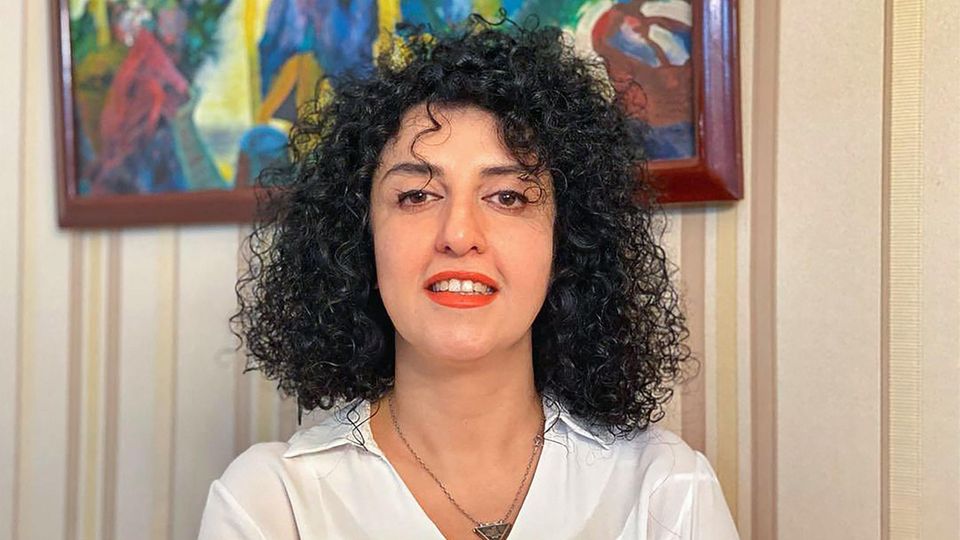Iranian human rights activist
Narges Mohammadi is imprisoned in Tehran – her children are giving their Nobel Prize speech
Narges Mohammadi’s 17-year-old twins Kiana and Ali Rahman accepted the Nobel Peace Prize
© Javad Parsa / NTB / AFP
Narges Mohammadi is behind bars and is currently on hunger strike. That’s why her children accepted the Nobel Peace Prize on behalf of the Iranian woman – and carried her words into the world.
At the awarding of the Nobel Peace Prize Narges Mohammadi, the Iranian human rights activist spoke out with a combative message from prison in Tehran. In her award speech, which was read out by her two children at the ceremony in Oslo on Sunday, Mohammadi harshly criticized the “tyrannical and misogynistic regime” in her country. The international community called on them to do more to promote human rights.
She is Iranian Womanwho is proud of carrying on the rich civilizational heritage of her country, “which is today oppressed by a tyrannical and misogynistic religious regime,” said the 51-year-old in her message read out to the Norwegian royal family, which she said was “behind the the high walls of a prison.
But the Iranian people “will eliminate all resistance and despotism through their perseverance,” she said confidently. “Don’t have any doubts – that’s for sure.”
Narges Mohammadi’s family is behind this
At the ceremony in the Norwegian capital’s town hall, her chair remained empty and a large portrait of her hung on the wall. The 51-year-old was unable to come to Oslo herself for the award ceremony and had to write her speech in the notorious Evin Prison. In Oslo there was an empty chair on stage for Mohammadi. Behind it hung a portrait of the award winner with her hair down – an allusion to the compulsory headscarf in the country Iran. In her place, her children, 17-year-old Kiana Rahmani and her twin brother Ali, who are in exile in France, accepted the Nobel Peace Prize. They gave their mother’s speech in French. Mohammadi’s husband Taghi Rahmani and other relatives were also in Oslo.
Mohammadi acknowledged in her Nobel Prize speech that she was one of millions of proud and resilient Iranian women who stood up against oppression, discrimination and tyranny. Living under a tyranny is like living an unarmed, defenseless person under rocket fire and a hail of bullets.
There is no independent judiciary in Iran, cronyism and corruption have plunged society into poverty and deep inequality, criticized Mohammadi. The government responds to protests with violence and arrests. The requirement for women to wear headscarves is an attempt to subjugate society
Mohammadi fights for women’s rights and freedom of expression in Iran
Narges Mohammadi plays a central role in the fight for women’s rights and freedom of expression in her country. She campaigns against the compulsory headscarf and the death penalty in Iran. For this she has been repeatedly imprisoned and whipped since 1998.
She has been in prison again since November 2021 for “propaganda against the state”. She is currently in Hunger striketo draw attention to the fate of the Baha’i religious minority, who are massively discriminated against in Iran. According to the Norwegian Nobel Committee, Mohammadi was arrested 13 times and sentenced five times – to a total of 31 years in prison and 154 lashes. She has repeatedly reported sexual violence and other ill-treatment in Evin Prison.
The Norwegian Nobel Committee awarded Mohammadi the Nobel Peace Prize in early October “for her fight against the oppression of women in Iran and her fight to promote human rights and freedom for all.”
The 51-year-old also supports the “Woman, Life, Freedom” protest movement that swept Iran after the death of the young Kurdish woman Mahsa Amini. The 22-year-old Amini died in September 2022 after being arrested for allegedly wearing a headscarf that was too loose. According to her family, she died after being mistreated by the moral police.
Fifth Nobel Prize winner in custody
Mohammadi warned that for the movement to be successful, it needed a strong Iranian civil society and international support. She is sure that the Nobel Peace Prize will strengthen the movement. “I am convinced that the globalization of peace and human rights is more fundamental and effective than the globalization of anything else,” she stressed.
“Today, Iranian youth have turned the streets and public spaces into an arena of civil resistance,” Mohammadi stated. “I am confident that the light of freedom and justice will shine brightly on the country of Iran.”
Mohammadi hasn’t seen her children for almost nine years. When asked whether they would ever see their mother again one day, Kiana told reporters on Saturday that she personally was “rather pessimistic.” Her brother Ali, however, assured that he remains “very, very optimistic.”
Mohammadi is the fifth laureate in the more than 120-year history of the Nobel Peace Prize to receive the award while in prison. She follows German journalist and pacifist Carl von Ossietzky, Aung San Suu Kyi from Myanmar, Liu Xiaobo from China and Ales Beliatski from Belarus.


